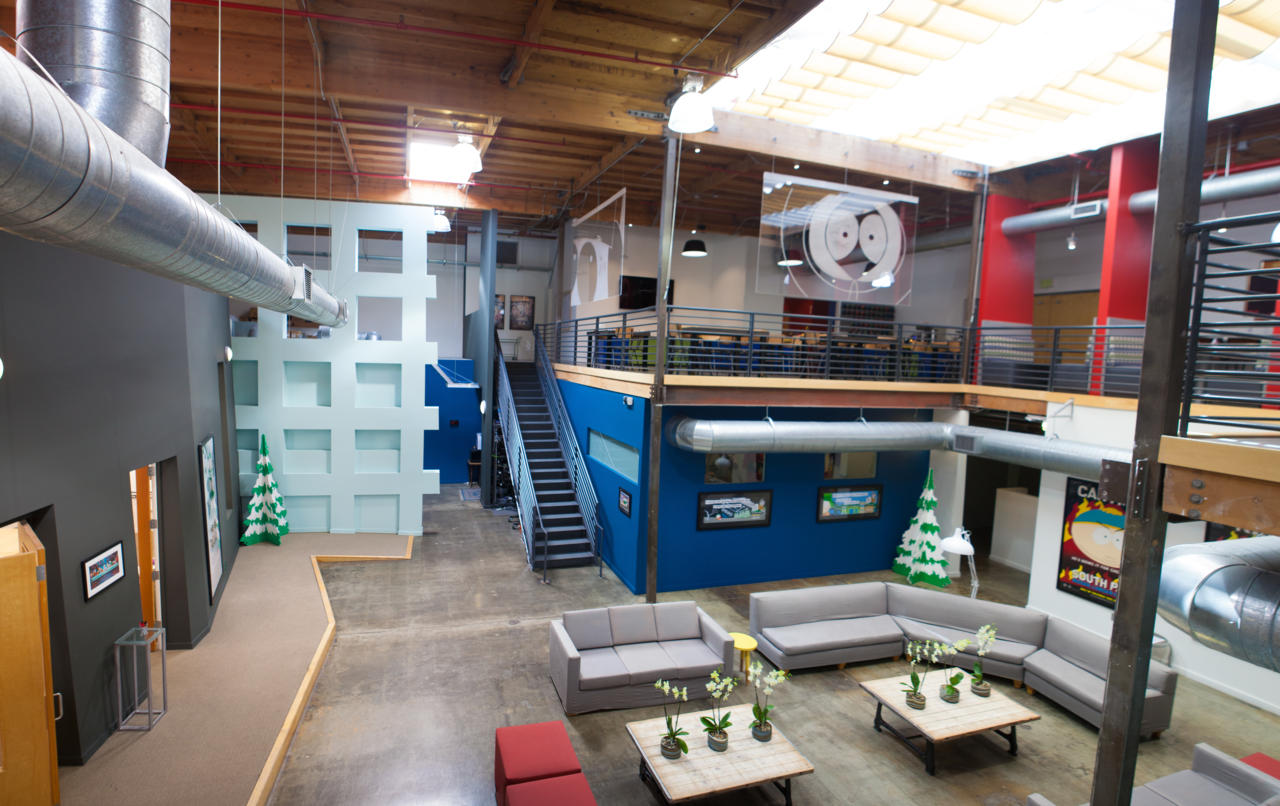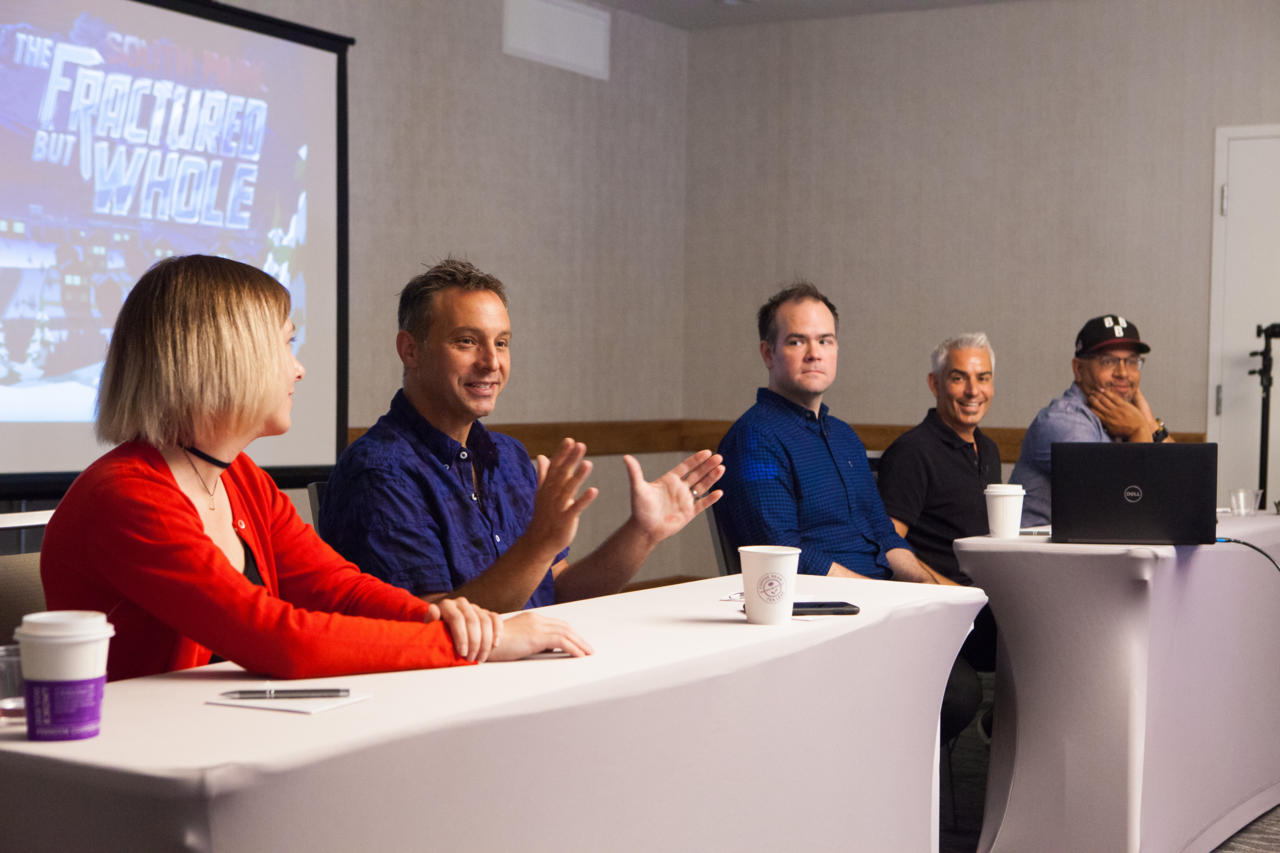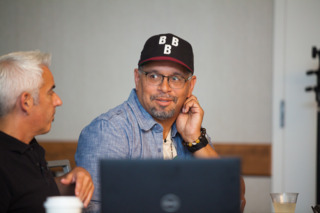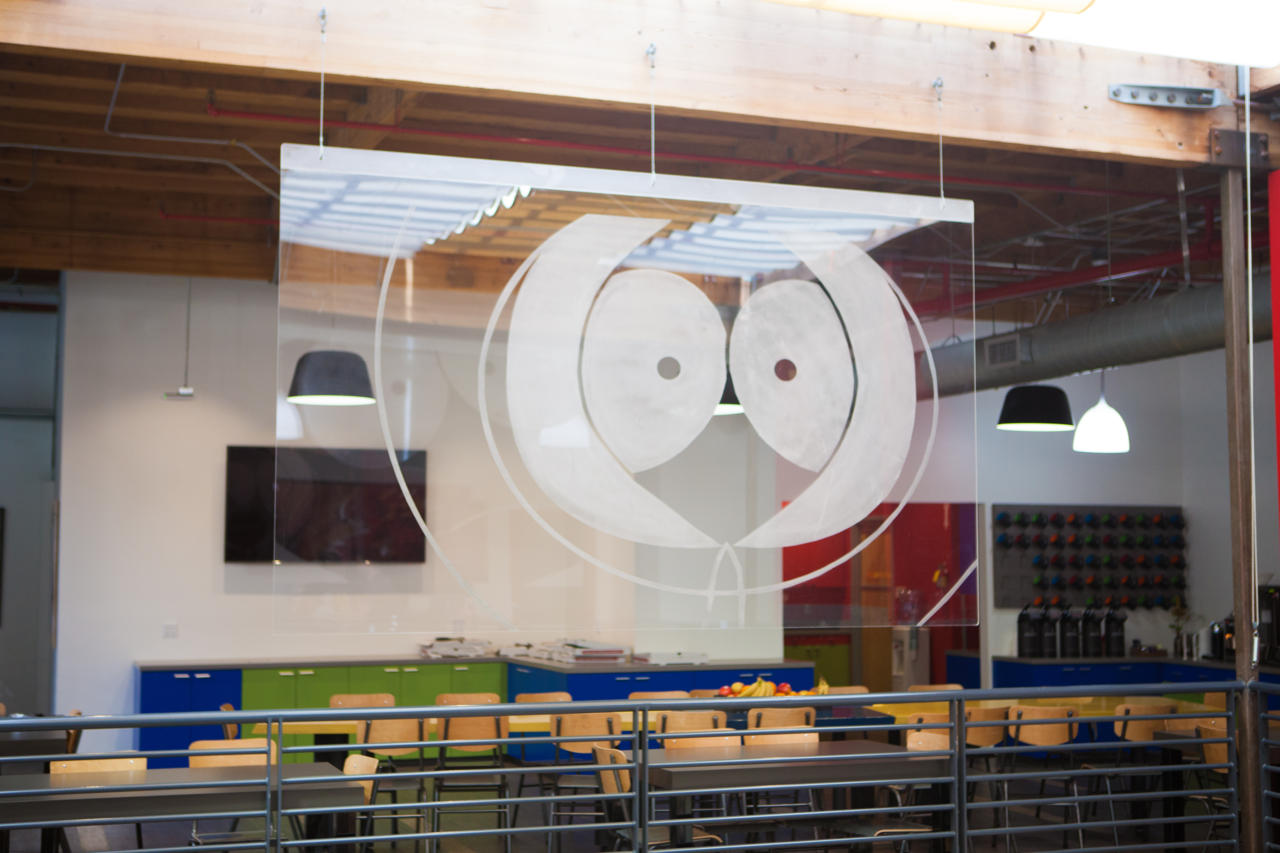I feel a little creepy. Sitting at a table across from me are actor Josh Gad and frequent South Park collaborator Bill Hader, talking with animated gusto. At the head of the long boardroom style table, Trey Parker listens carefully before also bursting into laughter.
I have no idea what they're saying. I'm just watching them for a few moments from across the room as I stand on the second floor railing of the South Park Studios. I'm looking into the writer's room, a glass-walled area filled with white boards, sketches, and chicken scratch writing.
Except for that animated discussion and a group of reporters in a room behind me, the studio is otherwise quiet. It's the week before the first episode of South Park season 21 airs, and the day before the larger crew will show up and begin the ten grueling weeks of production.
I'm here to witness, in this brief moment of respite, how the team coordinates with Ubisoft San Francisco to turn South Park into a living video game world. Trey Parker and Matt Stone are the head and face of South Park, but they rely on a surprisingly large number of people to make sure everything actually happens. And one of those people key to the video game is Jason Schroeder.
I. The Hand
Jason Schroeder doesn't look like someone who works on a game like South Park. Unassuming, with wispy brown hair, his calm humility feels almost at odds with a series that's defined by how over-the-top it goes.

But Schroeder, just like The Fractured But Whole, is more than he seems on the surface. His role as the game's creative director is itself a wide departure from his studio's previous projects, the most notable of which is probably the "rhythm game with real guitars game" Rocksmith. But with the transition to Fractured But Whole, the office has nearly tripled in size.
Schroeder joined was also in LA for the visit to South Park Studios, but the SF to LA trip, whether it's in person or via teleconference, is a normal part of his job. At the end of the trip, "I guess, in a typical day, I would either have a morning sync with the producers at South Park or Matt and Trey themselves, and then my own directors and project management group to kind of figure out, 'What are our burning fires? Is anybody waiting on decisions? What's ready for review?'" Even now, with the game released, the process isn't over; DLC is on the way, and that process takes just as much planning and coordination between the two primary creative studios.
"I was the liaison between our studios," Schroeder says. "So between South Park Studios and Ubisoft San Francisco, and the Osaka studio. Sometimes that meant that I felt like this weird prophet." Schroeder raises his hands above his head and affects a Moses-like voice. "It was like, 'No I cometh and I sayeth that Trey has speaketh.'"
Schroeder puts his hands down and leans in. "It became very important to not just become this person that is delivering messages from someone else. I had to agree with it and believe in it. If someone's going to look me in the eyes and ask, 'Is this okay? You tell me, because I'm going to work my ass off for this. Is this shitting mini-game really important to you?' I couldn't just say, 'Well, Trey said so."
But when you're helping a team decide how to portray the perfect bowel movement, what does normal even mean? "It's just your kind of average business meeting, in some ways, except that everyone's laughing--a lot." Schroeder breaks out into a grin. "I'd say the impression that you get from working with Trey is that he figures stuff out and then sees whether or not people laugh when he describes something. When the whole room starts laughing and then he can keep that laugh going, you start to feel like, 'Okay, this is going to stick.'"
"I just want the game to be sweet." -- Trey Parker
Schroeder leans back in his chair. "Working with them is just having that same sort of an observer ability; 'Okay, that little off the cuff remark just caused a whole avalanche of ideas, and we should take note.'"
But I'm getting ahead of myself. This is all at the end of my day, where I'm sitting with Schroeder back at his hotel after talking to the rest of the production team and touring the studio. The first time I met him that day was during small press conference set up to discuss the game and the people I'd be meeting that day.
II. The Gang's All Here
"At the very beginning of the project, we tried to convey to Ubisoft, 'We're gonna totally fuck up your entire workflow.'" This is Frank Agnone, the executive producer on the TV show and South Park's game products. He's sitting in on a roundtable discussion arranged for those of us visiting the studio before the tours start. Agnone is joined by Schroeder, and from the show there's also the producer and art director Adrien Beard, who's probably better known as Token. Eric Stough, another producer on the show who handles things on the animation side, is also well known as the real life inspiration for Butters. And from the Ubisoft side there's Jolie Menzel, the main narrative designer for The Fractured But Whole.

Agnone's earlier comments about disrupting the Ubisoft workflow aren't surprising for a show that's infamous for running its production down to the absolute last second. Six Days to Air, a 2011 documentary, showed the hectic, round-the-clock schedule that goes into putting out an episode during the show's normal run. But that kind of crunch can only work on a project with a limited schedule. That kind of intense, never-leave-the-office mentality is automatically capped at a few months because of the number of episodes. But for a videogame, where development is spread over years, that same relentless pace is just unrealistic.
But that didn't stop Trey from trying when he was out for two and half weeks for surgery. Agnone relates, "He convinced his doctor to let him leave the hospital to come to the office to record some dialogue, and then he would turn around and go back to the hospital."
Beard adds, "He's deathly walking out the door, and I'm like, 'Dude, you should totally be in a hospital. Dude, what are you doing? You're gonna die.' And he's like, 'I just want the game to be sweet.'"
But that kind of pace is the exception. Schroeder explains, "We have to be balanced because you make a lot of bad decisions when you get too tired. They are talking about 10 episodes over the course of a few months and so they do it in a very burst sort of way. When we first started to analyze their process and tried to figure out, 'How do we take that magic in the bottle or whatever it is that makes Trey's idea to a screen within a week? How do we capture that and put that into the game?' It wasn't so much about the hours that they spend or anything like that, it's actually about their pipelines, their processes, their culture of letting his creativity drive things, letting their investment in tools for the show be as efficient as they can be so that the team can work fast and without a lot of errors even when they're tired."
The process here means that the game's engine was modified so that the show team could script and put together scenes that would fold directly into the game. "You could kind of tell there was a change between the look of the gameplay and the cutscenes before," Eric says.
More than just the creation pipeline, South Park's quick turnaround comes from that drive to be relevant. To reflect what's happening now, and also to be able to change things when they're just not funny anymore. "There's this contemporary part that comes with South Park. Something happens in the news and it works its way into our show. That happened in the game, because we had this constant back and forth and this constant iteration building, Beard says. "I don't think many games are gonna be able to comment on stuff that happened two, three months before the game came out. And some of that stuff's in the game."

That comes back to Matt and Trey's involvement in the entire game process. "Letting them play hands on as much as possible was really the key," Menzel says. "If you watch any GDC talk about Assassin's Creed or Far Cry, you have this very beautiful, professional game design that's crafted by these designers and they're very sacred about their process. Matt and Trey challenged us to have that agility to even look at our own methodology and change it. To ask, 'How do we serve the story and how do we serve the jokes?'"
Jokes like, in Beard's words, "making a better, interactive fart." Schroeder holds up his hands and, with a surprisingly graphic bit of thumb twiddling that's meant to evoke massaging the thumbsticks on a controller, he describes the team's journey. "What can we do with the touch pad to really prime a sphincter, and then we push in." Here Schroeder cups his hands and pushes upward with his thumbs.
In addition to enhanced anal control, Beard says that they had hoped to explore in more ridiculous ways to interact with the game. He brings up the smell-o-vision device used during preview events for the Fractured But Whole that simulated the smell of farts. That's a step in the right direction, however he wants to go even further: "I want to have somebody suck their controller."
III. The Room Where It Happens
The panel ends, and we finally head to the studio. Large game developers tend to have sprawling campuses that bustle with hundreds of employees, and you expect something a little more epic when you visit the home of a show that's been a cultural touchstone for over 20 years. Instead, the South Park's headquarters is nestled among a group of nondescript office buildings. From the outside, the only indicator that this place is special is a small plaque near the door that reads "Casa Bonita."

Frank Agnone leads my small group's tour. Tanned and relaxed in a very So Cal way, Agnone also projects a contradictory intensity when he looks at you. He's been with the show since the first episode (a common thread among many of the production's senior leads), but he still carries the energy of a new employee.
Agnone walks us through the separate departments, each kept separate to allow them to focus on their various points of production. Trey isn't part of the tour, but each group talks about how the pipeline is created to both give him and Matt oversight and freedom to create and change anything immediately. Sometimes that means whole scenes have to be reworked or pushed back to other departments, but that's part of why they're so remote. The islands of work allow them to focus on finishing as the hours to each week's deadline countdown.
With boyish delight Beard stands in the art department's room and reiterates that they're eight days away from filming the first episode of the season, but the team still haven't gotten a single page of the script. But he's unphased, both Beard and Agnone remind the group of Six Days to Air, and then clarify that they probably need to re-film the documentary. The current schedule is more like four to five days.
And then, after a day filled with anal calisthenics demonstrated with finger motions, a quick walk through the offices and cubicles of the show, and an in-depth discussion about finding the perfect fart, I'm sitting with Schroeder back at the lobby of his hotel. But even with all the scatological humor and the drive to make sure South Park is as funny as it can possibly be, Schroeder has a surprising desire for The Fractured But Whole.
"It's hard to say it in a single sentence, but I hope that people don't like feel like they wish it had just been about anal probes. We're telling a more advanced story in a lot of ways. It's more the structure of the story, I feel like it's more mature. Not in the mature content, obviously there's mature content, but it's a story about substance abuse and all this other stuff too. I hope that the only takeaway isn't, 'I really liked when I walked up Mr. Slave's ass.'" He laughs before continuing. "Yeah, that stuff is funny as well, but I hope people appreciate it for the kind of story we told."







